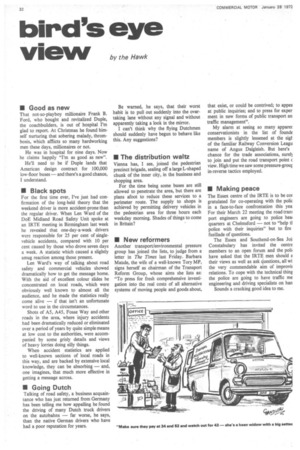bird's eye
Page 34

If you've noticed an error in this article please click here to report it so we can fix it.
viewby the Hawk
• Good as new
That not-so-playboy millionaire Frank B. Ford, who bought and revitalized Duple, the coachbuilders, is out of hospital I'm glad to report. At Christmas he found himself nurturing that sobering malady, thrombosis, which afflicts so many hardworking men these days, millionaires or not.
He was in hospital for nine days. Now he claims happily "Pm as good as new".
He'll need to be if Duple lands that American design contract for 100,000 low-floor buses — and there's a good chance, I understand.
• Black spots
For the first time ever, I've just had confirmation of the long-held theory that the weekend driver is more accident-prone than the regular driver. When Len Ward of the DoE Midland Road Safety Unit spoke at an IRTE meeting in Birmingham last week he revealed that one-day-a-week drivers were responsible for 25 per cent of singlevehicle accidents, compared with 10 per cent caused by those who drove seven days a week. A statistic which caused a slightly smug reaction among those present.
Len Ward's way of talking about road safety and commercial vehicles showed dramatically how to get the message home. With the aid of excellent colour slides he concentrated on local roads, which were obviously well known to almost all the audience, and he made the statistics really come alive — if that isn't an unfortunate word to use in the circumstances.
Shots of A5, A45, Fosse Way and other roads in the area, where injury accidents had been dramatically reduced or eliminated over a period of years by quite simple means at low cost to the authorities, were accompanied by some grisly details and views of heavy lorries doing silly things.
When accident statistics are applied to well-known sections of local roads in this way, and are backed by extensive local knowledge, they can be absorbing — and, one imagines, that much more effective in getting a message across.
• Going Dutch
Talking of road safety, a business acquaintance who has just returned from Germany has been telling me how appalling he found the driving of many Dutch truck drivers on the autobahns — far worse, he says, than the native German drivers who have had a poor reputation for years. Be warned, he says, that their worst habit is to pull out suddenly into the overtaking lane without any signal and without apparently taking a look in the mirror.
I can't think why the flying Dutchmen should suddenly have begun to behave like this. Any suggestions?
• The distribution waltz
Vienna has, I see, joined the pedestrian precinct brigade, sealing off a large L-shaped chunk of the inner city, in the business and shopping area.
For the time being some buses are still allowed to penetrate the area, but there are plans afoot to reduce these services to a perimeter route. The supply to shops is achieved by permitting delivery vehicles in the pedestrian area for three hours each weekday morning. Shades of things to come in Britain?
• New reformers
Another transport/environmental pressure group has joined the lists, to judge from a letter in The Times last Friday. Barbara Maude, the wife of a well-known Tory MP, signs herself as chairman of the Transport Reform Group, whose aims she lists as: "To press for fresh comprehensive investigation into the real costs of all alternative systems of moving people and goods about,
that exist, or could be contrived; to appee at public inquiries; and to press for exper ment in new forms of public transport an traffic management".
My alarm at seeing so many apparer conservationists in the list of founde members is slightly lessened at the sigi of the familiar Railway Conversion Leagu name of Angus Dalgleish. But here's chance for the trade associations, surd] to join and put the road transport point c view. High time we saw some pressure-grout in-reverse tactics employed.
• Making peace
The Essex centre of the IRTE is to be cot gratulated for co-operating with the polic in a face-to-face confrontation this yea For their March 22 meeting the road tram port engineers are going to police hew quarters at Chelmsford — not to "help ti police with their inquiries" but to fire fusillade of questions.
The Essex and Southend-on-Sea Joi Constabulary has invited the centre members to an open forum and the poll., have asked that the IRTE men should a their views as well as ask ciuestions, all wi the very commendable aim of improvii relations. To cope with the technical thing the police are going to have traffic me engineering and driving specialists on han Sounds a cracking good idea to me.
























































































